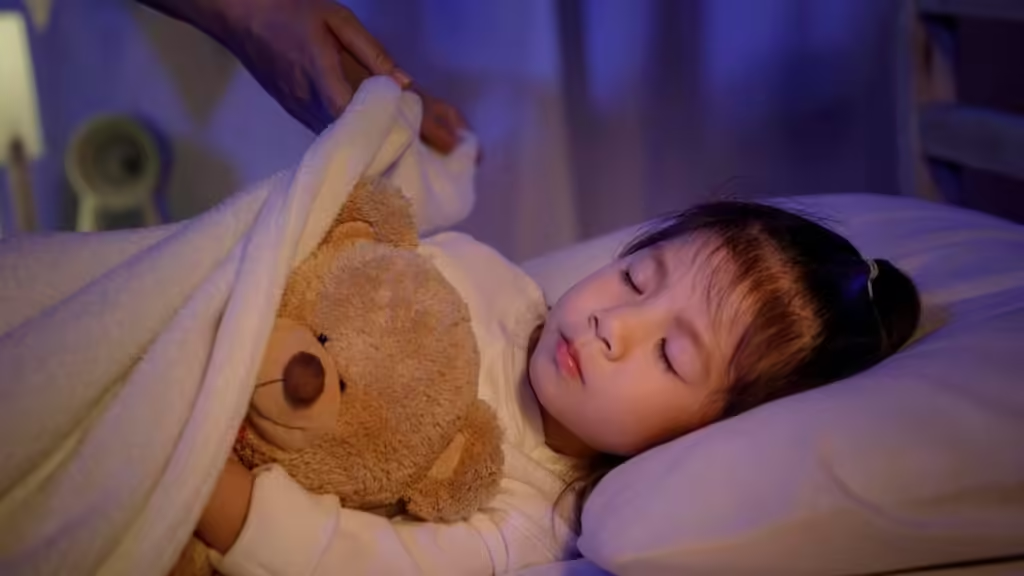Hello beautiful people, You also think sleep is just rest? If yes, then let me tell you that it’s one of the most vital components of growing kids’ overall health and well-being. I have experienced that establishing an effective kids sleep routine for our little ones is challenging and tough.
Kids need good sleep, The good news? Science has a solution: sleep routines! These routines help your kids sleep better naturally. This means more energy, better thinking, and staying healthy! Say goodbye to bedtime fights and hello to a rested, happy child with the power of a science-backed sleep routine!
Let’s dive in!
Importance of Growing Kids Sleep

We know that it plays an important role in the growth and development of children. During sleep our bodies undergo essential processes like:
- Tissue repair
- Growth hormone release
- Immune system strengthening
- Supports cognitive functions such as memory consolidation
- Problem-solving skills
- Attention span
- Better academic performance
- Improved concentration
- Overall cognitive functioning.
Sufficient sleep is associated with better emotional regulation, mood stability, and mental health. On the other hand, it’s lack can lead to irritability, mood swings, and increased stress levels, affecting behavioral patterns and exhibiting impulsive behavior, difficulty concentrating, and reduced social interactions. If you want emotional resilience and positive behavior in your growing kids, establish healthy sleep habits in them. You need to create a friendly environment, implement a consistent bedtime routine, and limit screen time before bed.
Building an Effective, Sleep-Friendly Environment
Following is a table on the steps for building a sleep-friendly environment for children:
Steps |
Description |
|
Bedroom Space |
You should check if the room is good for sleeping. You should check for:
|
|
Calm Atmosphere |
Make your child’s room quiet and cozy for bedtime. |
|
Comfortable Bed |
You should use comfy bed and soft blankets for your children. |
|
Limit Electronic Devices |
Keep electronic devices like mobile phones, tabs etc away from your children. |
|
Implement Bedtime Routine |
Make a regular routine before bedtime. It can include reading, bath, etc. |
|
Set Comfortable Temperature |
The room should not too be hot or cold. |
|
Light Exposure |
You should make sure the room is dark for sleep. |
|
Promote Daytime Activity |
Encourage playing during the day, so the kids will get tired and sleep well during night. |
|
Consistent Schedule |
Set regular times for sleeping and waking up just like children have fixed school timings. |
|
Adjust Schedule |
Watch how your child sleeps and change things if required. |
The following video is about how sleeping less can affect a child’s brain:
https://youtu.be/CoCL0IB4u4g?si=E1vDWL8QV1C7lARo
Addressing Common Sleep Challenges
Your kids might have sleeping troubles even when they have a good sleeping place and a regular routine. Here are some ways to help when sleep issues come up:
1. Bad Dreams and Night Frights
Bad dreams are basically scary dreams that kids remember when they wake up and night frights are more intense, making kids act scared or move without fully waking up. If your child has a night fright, stay calm, don’t try to wake them up completely, as this can confuse them more. Speak softly to them until it passes. You need to talk to your child in the morning about the bad dream he had at night and comfort them. Don’t focus too much on it, but let them know you’re there to help.
2. Wet Beds:
Many younger kids wet the bed, it’s not usually a medical problem, but it can be upsetting.
To avoid this don’t give your child lots of drinks right before bed. Before bed, tell your child to use and empty their bladder. Don’t scold your child for wet bed, you can use special bedding to help manage accidents. Talk to your child about it and make them understand that they can control this.
3. Early Wake-Ups
For a proper routine, get your child up at the same time every day, even on weekends. Don’t start the day right away with games if your child wakes up early. Keep things quiet until it’s time to get up. Have a calm morning routine that slowly gets brighter and busier.
Connection between Nutrition and Sleep
The link between nutrition and sleep is strong and can affect us in several ways. Some points are discussed below:
- Sleep Cycle Regulation: There are nutrients that can help regulate our sleep cycle. They promote the production of sleep-inducing hormones like serotonin and melatonin. These nutrients are:
- Tryptophan
- Magnesium
- Complex carbohydrates.
- Energy Levels: Eat a balanced diet to prevent energy crashes with a mix of:
- Carbohydrates
- Proteins
- Healthy fats.
- Blood Sugar Control: When you consume sugary foods close to bedtime, this’ll disturb your kid’s sleep by causing awakenings during the night.
- Digestive Comfort: Avoid heavy or spicy meals, acidic foods. This makes difficult to fall asleep or stay asleep.
- Hydration: Staying hydrated is important for overall health, including sleep. Dehydration can lead to:
- Dry mouth
- Snoring
- Disrupted sleep.
- Caffeine: Try to avoid caffeine, nicotine before bedtime. They can reduce overall sleep quality.
Alcohol: Alcohol disrupts sleep patterns that will lead to restful sleep.
The Science of Sleep Cycles
The science of sleep cycles plays a crucial role in determining the quality of our sleep. There are following different stages of sleep:
Stage 1: Light Sleep
This is the first stage, which typically lasts for a few minutes and it’s easy to wake up from this stage. This is the transition stage between your wakefulness and sleep. In this stage brain activity starts to slow down, and muscles relax.
Stage 2: True Sleep
This is a deeper stage of sleep where brain waves become slower, body temperature decreases and heart rate decreases. This stage makes up a significant portion of our total sleep time.
Stage 3: Deep Sleep
This stage is combined as slow-wave sleep (SWS) or delta sleep. Brain waves slow down and it becomes harder to wake up during this time. This is crucial for:
- Physical recovery
- Growth
- Immune function.
Stage 4: REM Sleep (Rapid Eye Movement)
REM sleep is characterized by rapid eye movements, increased brain activity, and vivid dreaming. In this stage our muscles are temporarily paralyzed. This stage is important for:
- Memory consolidation
- Emotional processing
- Learning.
The sleep cycle repeats throughout the night, with each cycle lasting about 90-110 minutes on average. If you understand sleep cycles, it’ll help you appreciate the importance of getting enough uninterrupted sleep each night to support optimal health and functioning during waking hours.
Giving your kids sunglasses is setting them up for eye diseases, vision problems, ill health, cellular damage, sunburn, skin issues, disordered sleep and even depression.
Artificial light is doing more damage to your children's eyes than the sun ever will☀️ pic.twitter.com/L40dkLlqhL
— Neve 🌷 (@naturallyneve) July 26, 2024
Conclusion
If you understand the science behind effective sleep routines, this will prove to be a game-changer for you and your kids. Now, you can transform bedtime battles into peaceful nights. Quality sleep is a foundation for physical health, mental well-being, and overall success.
You need to make a regular bedtime routine a priority so your child will have a happier, healthier life with lots of energy for learning, playing, and growing. Unlock a world of benefits, from improved mood and enhanced immunity and resilience. So, here’s to happy, rested families!
FAQ
Q: How much sleep does my child need?
A: Sleep needs vary by age group. Following table shows recommended sleep duration:
Age Groups |
Sleep Duration |
|
Newborns |
14-17 hours (including naps) |
|
Infants |
12-16 hours (including naps) |
|
Toddlers |
11-14 hours (including naps) |
|
Preschoolers |
10-13 hours (including naps) |
|
School-aged Children |
9-12 hours |
Q: What if my child resists the bedtime routine?
A: You, as parents, should be patient and consistent because your body resists changes. Address your child’s anxieties that might be causing sleep problems.
Q: How can I identify signs of sleep problems in my child?
- Staying asleep.
- Restless sleep.
- Daytime sleepiness
- Pauses in breathing during sleep.
- Bedwetting
- Other unusual behaviors during sleep.
Q: How can you transition from nap to sleep through the night?
- Reduce nap duration
- Ensure a consistent bedtime routine
- Offer comfort and reassurance
Q: What is role of nutrition in promoting quality sleep for my child?
Nutrition helps in promoting quality sleep for children by providing nutrients that support the sleep-regulating. A balanced diet with adequate hydration helps regulate:
- Energy levels
- Digestion
- Overall sleep-wake cycles.



